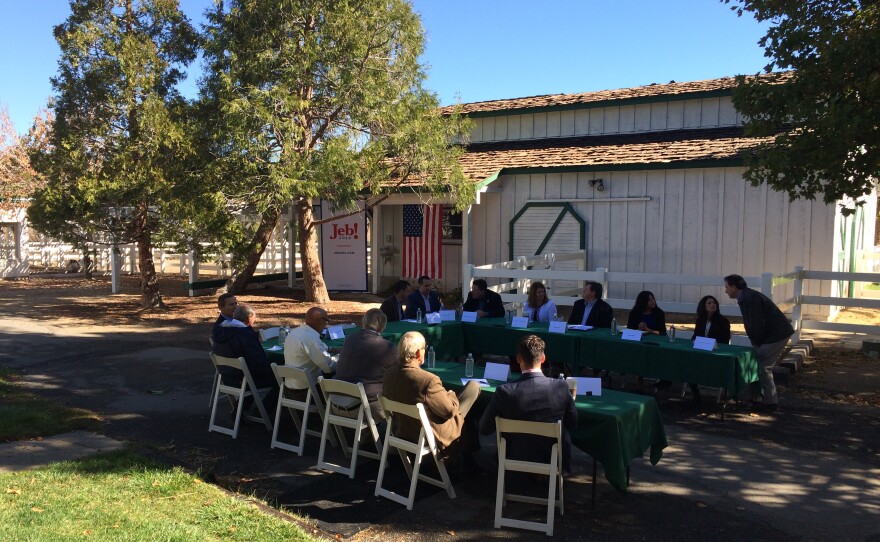Nevada drew a national spotlight to the issue of public lands last year when rancher Cliven Bundy faced off against the BLM. Now it's back in the headlines after presidential candidate Jeb Bush announced his public lands plan in Reno. Reno Public Radio’s Amy Westervelt reports.
Only about a dozen local supporters and an equal number of press were invited to San Rafael Park to hear Jeb Bush lay out his plan for public lands. As he wrapped up, a small group of protesters gathered outside the fence, voicing their support for keeping public lands public. Shaaron Netherton, with Friends of Nevada Wilderness, explains:
“Western people in particular use public lands for all kinds of recreation and we don’t want any policies that will get them sold off or traded to get rid of the debt. We believe that they’re a national treasure and they need to stay in the public’s hands.”
Public lands are a hot topic in Western states, particularly in Nevada, where the federal government owns more than eighty percent of the land. Bush said he would give state and local agencies more authority to decide how that land should be managed.
“First I think we need to move the Department of the Interior out of Washington, D.C.," Jeb Bush said. "Ninety percent of their work is out here, and there has been a history of having a secretary from the West, but the people doing the work, the ones who impede any kind of partnership from happening, all live in Maryland, Virginia and Washington.”
Bush went on to talk about streamlining the transfer of land from the Bureau of Land Management to private owners. He mentioned climate change, the cost of fighting wildfires and the need for better forest management, which he said should come from the private sector. He also suggested letting states take the lead on wildlife conservation, a point that was music to the ears of those who oppose federal listing of the sage grouse as endangered.
“There oughta be a states-first wildlife policy that allows states to implement their own plans for restoring and protecting the species," Bush suggested. "Washington took that out of the hands of the states and I think that was completely inappropriate.”
Only those seated at the table with Bush were given the opportunity to ask questions, including Elko assemblyman John C. Ellison. When he asked Bush for his thoughts on the link between public lands and economic development, the former Florida governor reiterated that local governments know best:
“I mean the sage grouse idea, there was a victory in a sense – it wasn’t listed. But then through the back door, the restrictions on land were so onerous it may have achieved the same goal; I don’t know.”
Bush pointed to the state he governed for years – Florida – where he says putting power in the hands of local government paved the way for manatee-protection strategies that have resulted in better outcomes for the marine mammals than what federal mandates were able to achieve.
“It took my leadership to be able to create a public partnership between the federal government and state government," Bush said. "We put up our own money and created a partnership and began to clean the water and save the water, protect the natural systems, protect the critters, provide access to the national park for people to hunt and fish and hike in it, but also made sure the systems were for the 6 to 7 to possibly 8 million people that depended upon it.”
Still, Nevada is not Florida and faces unique challenges with private land being land-locked by public land and vice versa.
Retired Reno resident Gretchen Sullivan and her son Sean happened upon the campaign event, thinking it was open to the public and curious to hear what Bush had to say. They said they liked his points about local leadership, precisely because Nevada’s public lands issues are fairly unique to the state.
“I’ve always heard, you know, if Nevada gets the land they’ll develop it, and that’s our right, that’s what other states have done," Gretchen Sullivan explained. "But that’s where the controversy comes in as well, because we have such great country here. It’s just beyond what any other state has in terms of federal land.”
“And I can see the point of it needing to be protected," Sean Sullivan said, "because there’s so much development so quick that everything could change so quick. I come to visit her here every year and it’s different every year: the strip malls just keep stretching out. If you don’t protect that land you’re going to wind up with strip mall after strip mall.”
It’s never been easy to balance economic development with conservation and recreation on public lands, which is why most politicians tend to steer clear of the issue. And even public lands advocates, like protester Shaaron Netherton, prefer to keep politics out of it:
“We’re not here for any political candidate. Public lands is not a partisan issue. People of all parties love public lands, so what we want to do is just be a voice for public lands. We don’t want to see public lands become a partisan issue.”
Trailing behind Donald Trump, Ben Carson, and Marco Rubio in the polls, however, Bush made a calculated decision to take on public lands – it’s an issue that resonates with Western voters, and particularly with Libertarians, whose votes Bush needs to overtake Rubio.
Rand Paul is the only other Republican presidential candidate who has said anything about public lands. On a trip to Nevada earlier this year he said he would privatize them all. Bush’s proposal is far more moderate, which may make it less appealing to libertarians, while his push for state control of public lands could turn off urbanites and sportsmen concerned about access for hunting and fishing. But first a crucial step: the caucus.







